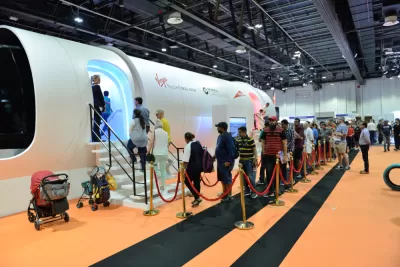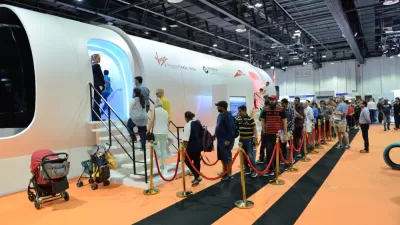The company sees cargo as a more promising and cost-efficient use of its technology.

Virgin Hyperloop is pivoting from moving passengers to transporting cargo and has laid off close to half of its employees, reports James Vincent in The Verge. "A spokesperson for Virgin Hyperloop told the [Financial Times] that the recent cuts would allow the company 'to respond in a more agile and nimble way and in a more cost-efficient manner' and that the decision to lose so many staff at once had not been 'taken lightly.'"
The US-based Virgin Hyperloop is one of the leading firms developing the eponymous technology — an updated version of a centuries-old idea to reduce the energy demands of trains by placing them in vacuum-sealed tubes where air resistance is minimal. The concept was resurrected in 2013 when Elon Musk published a whitepaper on the subject, incorporating magnetic levitation used by bullet trains and bestowing the current branding.
Despite early successes in testing, Vincent notes that Virgin Hyperloop has struggled to attract enough funding and reach additional milestones. "Moving cargo instead of people will simplify safety and regulatory burdens, according to DP World — an Emirati, state-owned logistics group that has a 76 percent stake in Virgin Hyperloop."
FULL STORY: Virgin Hyperloop switches focus from passengers to cargo as it lays off half its staff

Planetizen Federal Action Tracker
A weekly monitor of how Trump’s orders and actions are impacting planners and planning in America.

San Francisco's School District Spent $105M To Build Affordable Housing for Teachers — And That's Just the Beginning
SFUSD joins a growing list of school districts using their land holdings to address housing affordability challenges faced by their own employees.

The Tiny, Adorable $7,000 Car Turning Japan Onto EVs
The single seat Mibot charges from a regular plug as quickly as an iPad, and is about half the price of an average EV.

As Trump Phases Out FEMA, Is It Time to Flee the Floodplains?
With less federal funding available for disaster relief efforts, the need to relocate at-risk communities is more urgent than ever.

With Protected Lanes, 460% More People Commute by Bike
For those needing more ammo, more data proving what we already knew is here.

In More Metros Than You’d Think, Suburbs are Now More Expensive Than the City
If you're moving to the burbs to save on square footage, data shows you should think again.
Urban Design for Planners 1: Software Tools
This six-course series explores essential urban design concepts using open source software and equips planners with the tools they need to participate fully in the urban design process.
Planning for Universal Design
Learn the tools for implementing Universal Design in planning regulations.
Smith Gee Studio
City of Charlotte
City of Camden Redevelopment Agency
City of Astoria
Transportation Research & Education Center (TREC) at Portland State University
US High Speed Rail Association
City of Camden Redevelopment Agency
Municipality of Princeton (NJ)




























